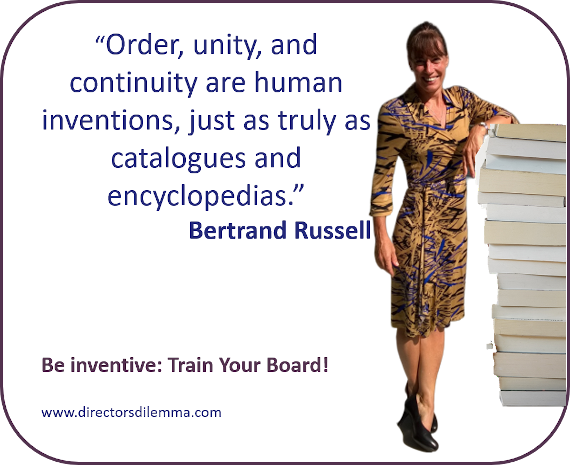|
|
|
|
|
|
|
|
|
Dear reader,
Welcome to the February 2020 edition of The Director’s Dilemma. This
month our dilemma examines the implications of expectations of a ‘quid
pro quo’ when asking people to assist a not-for-profit board.
In my twenty years’ experience consulting to, and sitting on, boards, I
have seen a lot of dilemmas; all can be resolved with goodwill, some
skill, and a committed hard-working board of directors. This month
our three contributors have provided a range of ideas in response to
the dilemma. I hope that you enjoy their insights and find them helpful
in extending your governance knowledge. Read to the end for details of a
free online webinar “The Secrets of Cohesive Boards”, the ‘quote of the
month’, and information on what has been happening over the past
months.
To read this email in a browser, go to www.mclellan.com.au/newsletter.html and click on 'read the latest issue'. I hope you enjoy the latest dilemma:
 Sarah sits on the unremunerated board of a not for profit that has the
good fortune of owning its own business premises. The Chair recently
invited an acquaintance, who has a deep experience in facilities
management and property development, to join the board.
Sarah sits on the unremunerated board of a not for profit that has the
good fortune of owning its own business premises. The Chair recently
invited an acquaintance, who has a deep experience in facilities
management and property development, to join the board.
At the new director’s first meeting the Chair asked him to prepare a
report on strategic options for maximising the value of the premises.
There would be design constraints, but, if those are managed, there is
potential to extend the building and give the company a more efficient
and modern working environment as well as an income stream from rental
of additional office space.
At the next meeting the new director presented a report and
suggested that his firm would be willing to undertake the design work
required to obtain the planning approval at no charge with the proviso
that, if a permit was obtained, his firm would undertake the
development.
Sarah pointed out the conflict of interest in this course of
action. The board is now split, with half the directors wanting to take
up the offer because it is a ‘no risk’ way to realise the potential and
the other half wanting to engage an independent firm to do the design
and/or construction even though this would require the organisation to
expend precious funds with a possible risk of not obtaining a permit.
The organisation does not have much cash in the bank and the building is
its biggest tangible asset. Even worse, the Chair now seems to blame
Sarah for the board disunity and has stated openly that “people like the
new director don’t join boards without some expectation of a reward for
their time, effort, and risk.”
How can Sarah help her board to regroup and proceed with good commercial sense as well as good governance?
|
|
|
|
Tony's Answer
 Firstly, did Sarah know that the proposition involved a conflict of
interest from personal knowledge and experience on other Boards, or was
she drawing on the not for profit’s own conflict of interest policy?
Firstly, did Sarah know that the proposition involved a conflict of
interest from personal knowledge and experience on other Boards, or was
she drawing on the not for profit’s own conflict of interest policy?
If it was the latter, the new Director should have been made aware of
this policy as part of a director induction process, so he knew the
expectations of him as a director including conflicts of interest and to
be motivated to join the Board for all the right reasons. If not, this
should have occurred.
If there is no conflict of interest of policy the first piece of advice
for Sarah would be to insist that a policy be developed and implemented
immediately, in order for this situation to be avoided in the future.
The next piece of advice for Sarah would be to draw on the assistance
of the other directors who support her position to speak against the
proposal and to rebut the proposition that new directors don’t join
boards without some expectation of a reward for their time etc. For the
Chair to use this as an argument strongly suggests he is not aware of
his important role as Chair to enforce the highest standards of
governance.
The next piece of advice to resolve this situation would be to suggest
the appointment of an independent governance expert to conduct a
mediation session with the whole board to try and find a solution and
take pressure of Sarah being the “responsible” Director for highlighting
the conflict of interest in the first place.
Tony Lawson
is the Executive Director of Laurel Palliative Care and Managing
Director of Tony Lawson Consulting. He is based in Adelaide, Australia.
|
|
|
|
Julie's Answer

Legitimate expectations of reward for the time, effort and risk of service on an unremunerated not-for-profit board are:
-
the satisfaction of a job well done, and
-
the respect and consideration of your peers.
When recruiting a new director to join it is important to discuss the
culture, expected contribution, and rewards of service on this board.
Failure to talk at the beginning can lead to even more difficult
conversations later.
Sarah’s board sounds dangerously passive. A good board would:
-
be involved in decisions about director appointments and suitability of candidates’ skills and culture fit.
-
discuss implications of any report on strategic options when the
report was commissioned; before anyone ‘invested’ time and effort into
investigating and writing it.
-
be alert to conflicts of interest, which include aligned interests, and have a policy to manage these.
-
welcome the raising of potential conflicts with a view to
understanding the risks so as to make a better, more nuanced decision.
-
Act as a cohesive team and seek to make decisions that all could support.
Sarah’s board needs to make a commercial decision about the potential
costs of locking in a preferred supplier versus the risk of spending
money on studies that may not bear fruit. They should apply their
conflict of interest policy which will likely preclude the new director
from taking part in the decision. It should not be an emotional or
personal conversation.
Sarah should have a quiet word with the Chair, or Audit Committee Chair
if that is more comfortable, and suggest getting this discussion onto
the next agenda so that the board can move forward with unity.
Once they have documented their decision they can proceed with either course of action.
Julie Garland McLellan is a non-executive director and board consultant based in Sydney, Australia.
|
|
|
|
Louise's Answer
 Sarah sits on a Board that has an opportunity to capitalise on the
asset they own. All boards, particularly non-for-profits, should
consider ways in improving their capital position for their
beneficiaries.
Sarah sits on a Board that has an opportunity to capitalise on the
asset they own. All boards, particularly non-for-profits, should
consider ways in improving their capital position for their
beneficiaries.
There (seemingly) was no negative response from the Board of appointing
a Property Expert, as they all saw benefit, value and need to bring
expertise to the Board. Moreover, there was no disagreement from the
Board in requesting the New Director to prepare a Report on strategic
options for maximising the value of the premises. We assume that the
Board also accepted the recommendations of the Report.
Sarah was correct in pointing out the potential conflict of interest,
which would be a requirement of any Board Director. The Board should
have processes/ Terms of Reference for expectations of Directors and
potential Conflicts of interest. In resolving this dilemma, Sarah should
suggest the following:
-
the Board seek tenders/quotations from the New Board Member’s firm+
other Design / Construction firms for the complete works required to
deliver the project i.e planning + design + construction;
-
the Board (excluding any input from the New Board Member) review and
analyse the Tender responses, bearing in mind that the New Board
Member’s firm would be providing pre-construction/ planning approval
& design work pro-bono, which their Tender Response theoretically
should be significantly less than the other Tenderers. It is important
to note that the costs associated with obtaining planning approvals are
significant and does not guarantee planning approval.
-
Following analysis by the Board, they should be able to determine if
the initial proposal from the New Board Member is indeed value for
money, and if so, could be accepted.
Louise Vlatko is Co-founder and Director of Xmirus and Director of Independent Living Villages. She is based in New South Wales, Australia
|
|
|
|
Book review - Not for Profit Board Dilemmas
Julie’s latest book is an engaging, even entertaining, tour of
dilemma’s faced by directors. It’s a nice balance. It avoids being heavy
weight-business school style case studies, yet provides sufficient
texture to make directors ask “What if?” This is key to her book,
encouraging directors to think ahead to potential problems. This leads
naturally to the importance of board members creating – in advance – a
structured process to address dilemmas. Julie helps board members to
gain domain knowledge. Without domain knowledge, dilemmas turn into
quagmires. While Julie’s energy in presentations is not to be missed,
her book will keep you thinking.
Brian Barnier, Board Member, health care non-profit, Connecticut, USA
Available at AICD or Amazon.com.
Julie's News - In January and December
Well December is always a great month in Sydney, Australia although
this year the festivities were overshadowed by the terrible bushfires
that ravaged our beautiful country.
Like many others I enjoyed the fireworks on the Harbour and decried the
devastation of our bush and the loss of life and livelihood of our
communities.
In December I enjoyed a great workshop on the role of boards in
ensuring ethical AI use, board meetings for my portfolio of boards and
some early strategic planning workshops for boards whose strategy is
refreshed in the new year. On the downside, the Board of Bounty Mining
had to make the difficult decision to enter into administration
following two roof-falls and a consequent loss of production.
January has been a busy month with more strategy workshops, an office
move, a board that is appointing a new CEO, and plenty of planning for a
productive 2020!
I am always keen to work more and will be delighted to hear
from you if you would like to arrange a board strategy workshop,
education session, or board performance review! Just call me on +61 411 262 470 or reply to this email for a discussion of how I might help your board.
Inspirational quote for February - This month my favourite quote is: 
Order, unity and continuity don’t just happen. They are the result of human action and skill.
A note on names - A few readers have asked me where I
find the names for the protagonists in each case study; I ‘borrow’ them
from people I meet or things that I read. Sarah is an old Hebrew name.
In the Bible Sarah is originally called Sarai which means quarrelsome.
Our protagonist must work hard not to embody that meaning. If she
succeeds, like her namesake, she may become known as Sarah – the modern
version of the name – which means Princess. There are many examples of
princesses throughout history who have brokered peace between nations
and factions. Our protagonist should aim to continue that tradition.
Free webcast “The Secrets of Cohesive Boards” - Great
boards pull together through any crisis. Cohesion can be built and
enhanced. On 6 February I will be talking with Phil Preston about the
techniques that I have seen used to successfully build board cohesion.
Things that any director, not just the chair, can do. You can register
via this link: https://bit.ly/30qU6wN.
I hope I will see you there.
This newsletter - If you have any ideas for improving
the newsletter please let me know. If you are reading a forwarded copy
please visit my website and sign up for your own subscription.
Suggestions for dilemmas - Thank you to
all the readers who have suggested dilemmas. They are greatly
appreciated. I will answer them all eventually. I could not write this
newsletter without your help and without the generous help of all the
experts who respond each month to the case studies.
Let me help you - If you would like me to speak to or train your board, staff, audience and/or group please contact me at julie@mclellan.com.au.
Be a contributor - If you would like to attempt a
response to the dilemmas for publication you will be most welcome.
Simply reply to this email and let me know.
Let's connect - I use LinkedIn to share information
about boards and directorship with my friends and acquaintances. If you
use LinkedIn and we are not yet connected I will welcome a connection
from you. You can find me at linkedin.com/in/juliegarlandmclellan.
Farewell until the next issue (due 1 March 2020). I look forward to
greeting you again then. In the interim I hope you will enjoy health,
happiness and hard work on your board careers: Enjoy governing your
companies; we are privileged to do what we do!
Best regards,
Julie

Disclaimer:
The opinions expressed above are general in nature and are
designed to help you to develop your judgement as a director. They are
not a definitive legal ruling and do not constitute legal advice. Names
and some circumstances in the case study have been changed to ensure
anonymity. Contributors to this newsletter comment in the context of
their own jurisdiction; readers should check their local laws and
regulations as they may be very different.
Privacy: I am privileged to have your contact details
and keep them as safely as possible. I will alert you if they are ever
accessed by any unauthorised person (the technical staff at ayuda
help with publishing and issuing the Director's Dilemma and have access
so they can send the newsletters to you). I do not sell your details to
anyone; they are kept only for the intended purpose - sending you this
newsletter and helping to build the judgement of company directors by
providing a safe way to consider potential responses to real life
events.
|
|
|
|
|
|
|
 Sarah sits on the unremunerated board of a not for profit that has the
good fortune of owning its own business premises. The Chair recently
invited an acquaintance, who has a deep experience in facilities
management and property development, to join the board.
Sarah sits on the unremunerated board of a not for profit that has the
good fortune of owning its own business premises. The Chair recently
invited an acquaintance, who has a deep experience in facilities
management and property development, to join the board.
 Firstly, did Sarah know that the proposition involved a conflict of
interest from personal knowledge and experience on other Boards, or was
she drawing on the not for profit’s own conflict of interest policy?
Firstly, did Sarah know that the proposition involved a conflict of
interest from personal knowledge and experience on other Boards, or was
she drawing on the not for profit’s own conflict of interest policy?
 Sarah sits on a Board that has an opportunity to capitalise on the
asset they own. All boards, particularly non-for-profits, should
consider ways in improving their capital position for their
beneficiaries.
Sarah sits on a Board that has an opportunity to capitalise on the
asset they own. All boards, particularly non-for-profits, should
consider ways in improving their capital position for their
beneficiaries.
